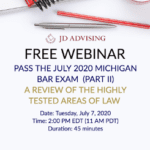How To Eliminate Wrong MBE Answers
How To Eliminate Wrong MBE Answers
One strategy to attack MBE questions when you don’t know the answer is to eliminate wrong answer choices. In this post, we discuss some tips on how to spot and eliminate wrong MBE answers.
How To Eliminate Wrong MBE Answers
1. Spot the answers that misstate the law.
Many students think that the goal of memorization is to be able to write accurate rule statements in essays. However, memorization also plays a huge role in the MBE! Knowing the rules word-for-word will help you spot answer choices that incorrectly state the law, even if the inaccuracy is only slight! If you invest the time to memorize and know the law word-for-word, you can quickly eliminate these incorrectly-stated answer choices!
For instance, a Constitutional Law question could ask, “What level of scrutiny applies to the situation?”. Let’s say the correct answer is rational basis. The test for rational basis is that the challenger must demonstrate that the law is not rationally related to a legitimate government interest.
There are a few ways you could see this test misstated in an answer choice.
Here are some examples:
- They could incorrectly put the burden on the government. In incorrect answer choice would state rule as follows: the government must demonstrate that the law is rationally related to a legitimate government interest. This is incorrect because the challenger, not the government, bears the burden in a rational basis analysis).
- They could also misstate the type of interest involved. For instance: The challenger must demonstrate that the law is not rationally related to an important government interest. This is also incorrect – it is a legitimate interest, not an important interest.
- Or, they could misstate the relationship between the law and the interest. The incorrect answer choice would read: The challenger must demonstrate that the law is not substantially related to a legitimate government interest. This is also incorrect because the law only needs to be rationally related, not substantially related.
Knowing the black-letter law word-for-word will help you spot these incorrectly-stated answer choices. These can then quickly be eliminated, even without thinking about the call of the question!
2. Understand the issue the call of the question is testing.
Some answer choices have nothing to do with the question being asked and thus can be eliminated. This is why it is important to stop reading after you read the call of the question. Before you get to the answer choices, ask yourself what issue is being tested. Sometimes, the answer choices, even the irrelevant ones, seem to make sense and may be alluring. However, they may not be relevant to the call of the question. Identifying the issue prior to reading the answer choices can help you avoid the allure of the irrelevant answer choices.
Here is an example:
If an Evidence question asks whether a piece of information is admissible as substantive evidence, that is a hint that it is probably a hearsay (or possibly a character evidence) issue. So, if you see an answer choice that states a rule about impeachment (e.g., “Yes, because it shows that the witness was biased.”) that is not a good answer choice as it is not responsive to the call of the question, and can be eliminated.
3. Be very cautious of strongly-worded answers.
Answer choices that contain strong language such as “only”, “never”, and “always” can often be eliminated because they are too strongly-worded. It is commonly joked that there are more exceptions to the law than there are laws.
Here is an example:
A Contracts question testing contract formation and revocation of an offer might ask, “Did the offeror properly revoke the offer?” An (incorrect) answer choice could state, “Yes, because offers to enter into unilateral contracts are always revocable.” Even if the exceptions are not applicable to this fact pattern, this answer choice is too strongly worded and essentially misstates the law! So, even if this sounds good on its face, you can usually eliminate these strongly-worded answer choices!
4. Don’t eliminate “if” and “unless” answers too quickly.
If an answer choice says, “Yes, if . . .” or “No, unless . . .” the words that follow essentially change the facts of the fact pattern, so you MUST consider how those facts change the analysis before eliminating that answer choice! Even though you might already know the answer to the call of the question based on the initial fact pattern, the additional fact could make the “if” or “unless” answer choice better than another answer choice that responds to the question without the additional fact.
This is not to say that you should always pick the “if” or “unless” answer choice. But you should not eliminate it right away. Always skim the other answer choices after you pick an answer to make sure that you have picked the BEST answer choice and that there isn’t a better answer!
Seeking MBE Assistance?
Seeking MBE Assistance?
- 📘 MBE Guide: Equip yourself with our FREE expert-crafted bar exam and MBE guides.
- Free Bar Exam Resource Center: Discover top resources, articles, and free webinars led by renowned bar exam professionals.
Top Resources as Vouched by our Students:
- MBE One-Sheets: One of our most highly acclaimed bar exam supplements!
- Bar Exam Outlines: Our comprehensive and condensed bar exam outlines present key information in an organized, easy-to-digest layout.
- MBE Private Tutoring: Opt for personalized, effective strategies.
- On Demand Bar Exam Course: Comprehensive bar exam preparation.
- Bar Exam Crash Course and Mini Outlines: Acclaimed and effective for a quick refresher.
- MBE Mastery Class, Real MBE Questions, and MBE Guide: Elevate your MBE preparation with these high-quality MBE supplements!
🔥 NEW! Check out our Repeat Taker Bar Exam Course and get introduced to our unmatched platinum Guarantee Pass Program.








Leave a Reply
Want to join the discussion?Feel free to contribute!